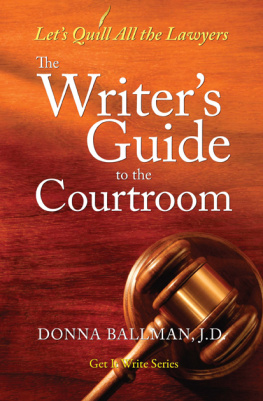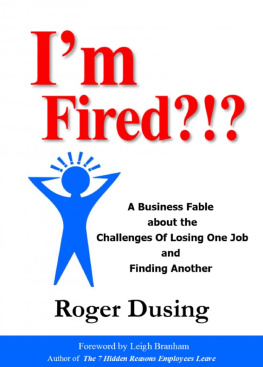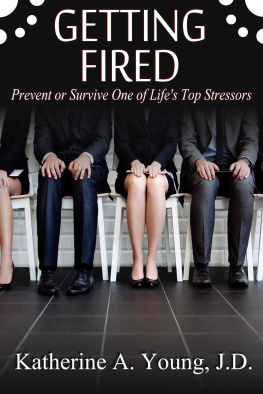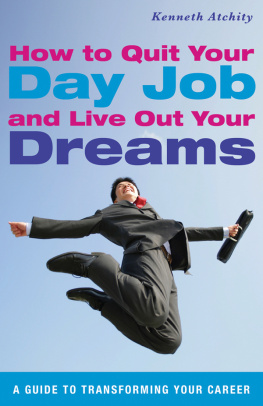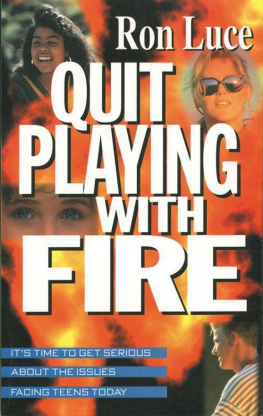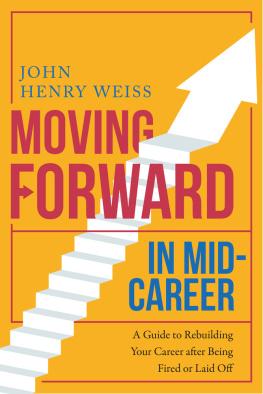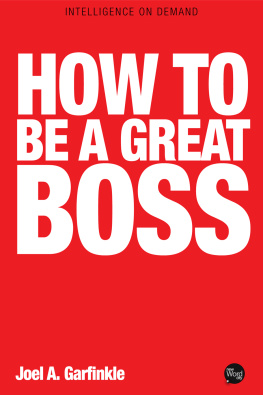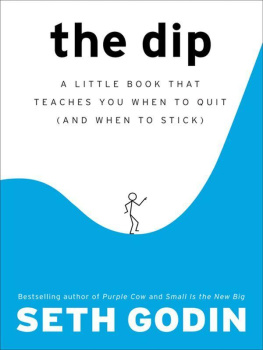Stand Up for Yourself Without Getting Fired
STAND UP FOR YOURSELF
WITHOUT GETTING FIRED
Resolve Workplace Crises Before You Quit, Get Axed, or Sue the Bastards
DONNA BALLMAN

Copyright 2012 by Donna Ballman
All rights reserved under the Pan-American and International Copyright Conventions. This book may not be reproduced, in whole or in part, in any form or by any means electronic or mechanical, including photocopying, recording, or by any information storage and retrieval system now known or hereafter invented, without written permission from the publisher, The Career Press.
STAND UP FOR YOURSELF WITHOUT GETTING FIRED
EDITED BY JODI BRANDON
TYPESET BY EILEEN MUNSON
Cover design by Wes Youssi/M80 Branding
Printed in the U.S.A.
To order this title, please call toll-free 1-800-CAREER-1 (NJ and Canada: 201-848-0310) to order using VISA or MasterCard, or for further information on books from Career Press.

The Career Press, Inc.
220 West Parkway, Unit 12
Pompton Plains, NJ 07444
www.careerpress.com
Library of Congress Cataloging-in-Publication Data
Disclaimer
Oh, come on. This is written by a lawyer. You had to know there would be one. Buying and reading this book does not create an attorney-client relationship between Donna M. Ballman, PA, and you, or between Donna Ballman and you. Although this book offers scenarios that may be similar to your situation, the suggested solutions are not guaranteed to have specific results. Nothing in this book is guaranteed to prevent you from being fired. The law is constantly changing. The writer is human, and is thus prone to making the occasional error. This book has no warranty whatsoever. It offers general career advice and not specific legal advice for your situation. If a legal issue arises, speak to an attorney who handles employment law in your state. The National Employment Lawyers Association (NELA) has members throughout the country who handle employee-side issues. Their directory can be found at www.nela.org.
Dedication
To everyone who works for a living, from janitor to CEO, from intern to human resources professional. To employment lawyers everywhere, fighting for workers rights against all odds. To justice.
Acknowledgments
This book would not have been possible without the hard work and assistance of many people. To Katharine Sands of the Sarah Jane Freymann Literary Agency, my wonderful agent, who listened to my ideas and helped make them better. To Tanya Earley, who did my fact-checking and kept me on the straight and narrow. If I got it right, its thanks to Tanya. If I got it wrong, that was all me. To Raquel Suarez, who makes sure I show up when Im supposed to and keeps things running even when Im holed up writing. To Suzanne Lucas, Cindy Krisher Goodman, Alison Greene, and Art Schofield, without whose support and encouragement this project never would have come to fruition. To Michael Pye of Career Press, who believed in me enough to take a chance on putting my words into print. To Jodi Brandon, my excellent editor, who made sure this book was as good as it could be, and the rest of Career Press editorial and publicity staff, who worked hard to make this book a success.
And mostly to Ben, Madeline, and Amelia, for putting up with me while I disappeared into my writing. Youre my inspiration and my reason for being. I love you.
Contents
In the Beginning:
Applications, Interviews, Accepting the Job, Contracts
The First Few Weeks:
Starting Your New Job
The Basics While Youre Working:
Wages, Hours, Breaks, Benefits, Sick Time, E-Mail,
Social Networking, At-Will, Right to Work
Bad Stuff Happens:
Discipline, Bullies, Coworkers, and Harassment
Good Stuff Happens:
Promotions, New Contracts
Evidence Gathering:
What You Need to Prove Discrimination, Harassment,
Whistle-Blowing
The End:
Layoffs, Terminations, References, Severance
Post-Employment Blues:
Unemployment, Defamation, Non-Competes,
Confidentiality, Interference With New Employment
Introduction
So, you hate your job and are ready to quit. Your boss is a flaming jerkweed and youre ready to tell him off. Or layoffs are imminent. You think youre about to be fired. Maybe you think you have a lawsuit thats your ticket out of the workplace.
Stop right there.
Before you take any drastic action, or drastic action is done to you, think. Plan. Develop a strategy to deal with your workplace crisis before it blows up. Know your rights as an employee, and your responsibilities.
Its really tempting sometimes to scream I quit! To write a long letter to the CEO describing how your boss is incompetent or unfair. To say something that youll regret later. Dont do it. Because everything you put in writing or say, especially around the end of your employment, can and will be held against you.
Trust me: What you think you know about your employment rights is probably dead wrong.
Maybe you have claims against the company. Maybe, if you dont have claims yet, you will. Dont blow it by failing to act strategically now. You might save your job. Maybe get the jerk fired or disciplined. At the very least, you might develop the evidence you need to take your employer or former employer to court successfully.
As an employment lawyer who has practiced employee-side employment law for more than 25 years, I sometimes wish my clients could carry me around in their purse or briefcase so I could stop them before they get themselves in trouble or fired. Now they can, and so can you.
This guide is a quick reference for some of the most common questions that come up about employee rights. This book is not meant to be legal advice or cover every employment issue. When in doubt, contact an employment lawyer in your state. Its best to get answers before you act than to wait until its too late, or youve already done something that gets you fired, or that might cost you a case.
If I can save one employees job, or help your lawyer and you sue the bastards and win, my work here is done.
1 In the Beginning:
Applications, Interviews, Accepting the Job, Contracts
Can They Really Ask That on My Application?
For many employers, the employment application is the first contact they have with you as a prospective employee. What can they ask you? What does it mean? How should you answer some of those questions? Here are some areas of concern in your employment application:
Arrests/Convictions: In some states, companies arent allowed to ask about arrests, but if they do, answer truthfully. Same with convictions. If your conviction is expunged, check the states law where the expunction happened. In most states, if the conviction is expunged, you can honestly answer no to questions about arrests and convictions, with certain exceptions (such as law enforcement jobs). Precluding applicants from being hired due to an arrest or conviction might also have an adverse impact on minorities, and could be discrimination. If they ask this, get a copy of the application or make a note of the exact question and your answer.
Age, Sex, Religion, Race, National Origin, Disability, and Genetic Information: Your employer isnt supposed to ask questions that reveal a protected status. What do you do if they ask these questions? Answer truthfully, but keep a copy of the application with the inappropriate question. If youre turned down, it might give you ammunition for a discrimination claim later. If you want the job, dont make a stink about the question. If you feel you must raise the issue, get hired, and then point it out gently after youve become a trusted employee of at least six months to a year.
Next page

